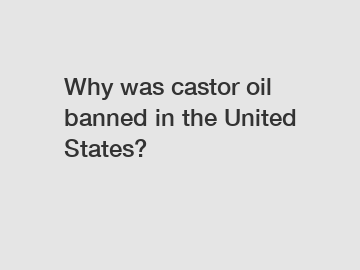Why was castor oil banned in the United States?
Castor oil has long been used for its various health benefits, but many people are unaware that it was actually banned in the United States for a period of time. The ban on castor oil was mainly due to its potential toxicity and misuse, leading to the government taking action to protect the health and safety of its citizens. In this article, we will explore the reasons behind the ban on castor oil in the United States.
**History of Castor Oil**.
Castor oil is derived from the seeds of the castor plant, also known as Ricinus communis. It has been used for centuries for its medicinal properties, ranging from treating constipation and arthritis to inducing labor in pregnant women. Castor oil is also commonly used in cosmetics, soaps, and lubricants due to its moisturizing and lubricating properties. However, despite its many uses, the misuse and toxicity of castor oil led to its ban in the United States.

**Toxicity Concerns**.
One of the main reasons castor oil was banned in the United States is due to its toxicity. Castor oil contains a toxic compound known as ricin, which is a protein that can be deadly if ingested in large amounts. Ricin is a potent poison that can cause nausea, vomiting, diarrhea, and even death in extreme cases. While the levels of ricin in castor oil are typically low, there was still a concern that people could potentially misuse it and suffer from ricin poisoning.
**Misuse of Castor Oil**.
Another reason for the ban on castor oil in the United States was due to its misuse as a laxative. Castor oil is a powerful laxative that works by stimulating the muscles in the intestines, causing them to contract and promote bowel movements. However, the misuse of castor oil as a laxative can lead to dehydration, electrolyte imbalances, and even dependence on the laxative for regular bowel movements. As a result, the government decided to ban castor oil as an over-the-counter laxative to prevent these potential health risks.
**Regulation and Reversal of the Ban**.
In 1962, the Food and Drug Administration (FDA) officially banned the sale of castor oil as an over-the-counter laxative due to its potential toxicity and misuse. However, in 1994, the FDA reversed its decision and allowed the sale of castor oil as an over-the-counter laxative with certain restrictions. These restrictions included warning labels about the potential side effects of castor oil, as well as guidelines for safe and appropriate use. The FDA's decision to reverse the ban on castor oil was based on new research and evidence showing that when used properly, castor oil is safe and effective as a laxative.
**Conclusion**.
In conclusion, castor oil was banned in the United States due to concerns about its toxicity and misuse as a laxative. The presence of ricin, a toxic compound in castor oil, as well as the potential health risks associated with its misuse, led to the government taking action to protect the public. While the ban on castor oil has since been reversed with certain restrictions, it is important for consumers to use castor oil responsibly and follow the guidelines provided by the FDA to ensure their safety and well-being.
If you have any questions or concerns about the use of castor oil, please do not hesitate to contact us.
If you are looking for more details, kindly visit ce certification stainless steel screw press, best home oil press machine, oil press accessory.
168
0
0

Comments
All Comments (0)